Deck 18: Magnetism
Question
Question
Question
Question
Question
Question
Question
Question
Question
Question
Question
Question
Question
Question
Question
Question
Question
Question
Question
Question
Question
Question
Question
Question
Question
Question
Question
Question
Question
Question
Question
Question
Question
Question
Question
Question
Question
Question
Question
Question
Question
Question
Question
Question
Question
Question
Question
Question
Question
Question
Question
Question
Question
Question
Question
Question
Question
Question
Question
Question
Question
Question
Question
Question
Question
Question
Question
Question
Question
Question
Question
Question
Question
Question
Question
Question
Question
Question
Question
Question

Unlock Deck
Sign up to unlock the cards in this deck!
Unlock Deck
Unlock Deck
1/136
Play
Full screen (f)
Deck 18: Magnetism
1
We observe that there is no magnetic force exerted on a moving charged particle.From this we can definitely conclude that
A)no magnetic field exists in that region of space.
B)the particle must be moving parallel to the field vector.
field vector.
C)the particle is moving at right angles to the field vector.
field vector.
D)either no magnetic field exists or the particle is moving parallel to the field.
field.
E)either no magnetic field exists or the particle is moving perpendicular to the field.
the field.
A)no magnetic field exists in that region of space.
B)the particle must be moving parallel to the
 field vector.
field vector.C)the particle is moving at right angles to the
 field vector.
field vector.D)either no magnetic field exists or the particle is moving parallel to the
 field.
field.E)either no magnetic field exists or the particle is moving perpendicular to
 the field.
the field.D
2
When a charged particle is moving in a static uniform magnetic field
A)there will always be a magnetic force exerted on it, regardless of its direction of motion.
B)there may be a magnetic force exerted on it which will cause its speed to change.
C)there may be a magnetic force exerted on it, but its speed will not change.
D)there may be a magnetic force exerted on it, but its direction of motion will not change.
E)None of the above statements are true.
A)there will always be a magnetic force exerted on it, regardless of its direction of motion.
B)there may be a magnetic force exerted on it which will cause its speed to change.
C)there may be a magnetic force exerted on it, but its speed will not change.
D)there may be a magnetic force exerted on it, but its direction of motion will not change.
E)None of the above statements are true.
C
3
Which one of the following statements is correct?
A)Earth's geographic north pole is the north pole of Earth's magnetic field.
B)Earth's geographic south pole is the south pole of Earth's magnetic field.
C)The north pole of a magnet points towards Earth's geographic north pole.
D)The north pole of a magnet points towards Earth's geographic south pole.
E)None of the above statements is correct.
A)Earth's geographic north pole is the north pole of Earth's magnetic field.
B)Earth's geographic south pole is the south pole of Earth's magnetic field.
C)The north pole of a magnet points towards Earth's geographic north pole.
D)The north pole of a magnet points towards Earth's geographic south pole.
E)None of the above statements is correct.
C
4
A proton,moving north,enters a magnetic field.Because of this field,the proton curves downward.We may conclude that the  field must have a component
field must have a component
A)downward.
B)upward.
C)towards the east.
D)towards the west.
E)towards the north.
 field must have a component
field must have a componentA)downward.
B)upward.
C)towards the east.
D)towards the west.
E)towards the north.

Unlock Deck
Unlock for access to all 136 flashcards in this deck.
Unlock Deck
k this deck
5
An electron moving in the +y direction,at right angles to a magnetic field,the magnetic force exerted on it is in the -x direction.The direction of the  field is in the
field is in the
A)-x direction.
B)+x direction.
C)+y direction.
D)-z direction.
E)+z direction.
 field is in the
field is in theA)-x direction.
B)+x direction.
C)+y direction.
D)-z direction.
E)+z direction.

Unlock Deck
Unlock for access to all 136 flashcards in this deck.
Unlock Deck
k this deck
6
An electron,moving south,enters a magnetic field.Because of this field,the electron curves upward.We may conclude that the  field must have a component
field must have a component
A)downward.
B)towards the east.
C)upward.
D)towards the west.
E)towards the north.
 field must have a component
field must have a componentA)downward.
B)towards the east.
C)upward.
D)towards the west.
E)towards the north.

Unlock Deck
Unlock for access to all 136 flashcards in this deck.
Unlock Deck
k this deck
7
An electron,moving west,enters a magnetic field.Because of this field the electron curves upward.We may conclude that the  field must have a component
field must have a component
A)towards the north.
B)towards the south.
C)upward.
D)downward.
E)towards the west.
 field must have a component
field must have a componentA)towards the north.
B)towards the south.
C)upward.
D)downward.
E)towards the west.

Unlock Deck
Unlock for access to all 136 flashcards in this deck.
Unlock Deck
k this deck
8
A positive charge is moving to the right,an upward magnetic force exerted on it,as shown in the figure.In which direction must the  field have a component?
field have a component? 
A)to the right
B)to the left
C)upward
D)out of the page
E)into the page
 field have a component?
field have a component? 
A)to the right
B)to the left
C)upward
D)out of the page
E)into the page

Unlock Deck
Unlock for access to all 136 flashcards in this deck.
Unlock Deck
k this deck
9
A proton is to orbit Earth at the equator using Earth's magnetic field to exert part of the necessary radial component of the sum of the forces.In what direction should the proton move?
A)upward
B)northward
C)southward
D)eastward
E)westward
A)upward
B)northward
C)southward
D)eastward
E)westward

Unlock Deck
Unlock for access to all 136 flashcards in this deck.
Unlock Deck
k this deck
10
An electron is moving to the right,as shown in the figure.Suddenly it encounters uniform magnetic field pointing out of the page.Which one of the three paths shown will it follow in the field? 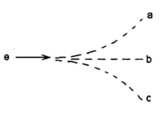
A)path a
B)path b
C)path c

A)path a
B)path b
C)path c

Unlock Deck
Unlock for access to all 136 flashcards in this deck.
Unlock Deck
k this deck
11
Three particles travel through a region of space where the  field is out of the page,as shown in the figure.What are the signs of the charges of these three particles?
field is out of the page,as shown in the figure.What are the signs of the charges of these three particles? 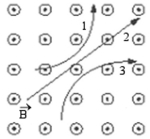
A)1 is neutral, 2 is negative, and 3 is positive.
B)1 is neutral, 2 is positive, and 3 is negative.
C)1 is positive, 2 is neutral, and 3 is negative.
D)1 is positive, 2 is negative, and 3 is neutral.
E)1 is negative, 2 is neutral, and 3 is positive.
 field is out of the page,as shown in the figure.What are the signs of the charges of these three particles?
field is out of the page,as shown in the figure.What are the signs of the charges of these three particles? 
A)1 is neutral, 2 is negative, and 3 is positive.
B)1 is neutral, 2 is positive, and 3 is negative.
C)1 is positive, 2 is neutral, and 3 is negative.
D)1 is positive, 2 is negative, and 3 is neutral.
E)1 is negative, 2 is neutral, and 3 is positive.

Unlock Deck
Unlock for access to all 136 flashcards in this deck.
Unlock Deck
k this deck
12
A charged particle moving along the +x-axis enters a uniform  field pointing along the +z-axis.A uniform electric field is also present.Due to the combined effect of both fields,the particle does not change its velocity.What is the direction of the electric field?
field pointing along the +z-axis.A uniform electric field is also present.Due to the combined effect of both fields,the particle does not change its velocity.What is the direction of the electric field?
A)along the -y-axis
B)along the +y-axis
C)along the -x-axis
D)along the +x-axis
E)along the -z-axis
 field pointing along the +z-axis.A uniform electric field is also present.Due to the combined effect of both fields,the particle does not change its velocity.What is the direction of the electric field?
field pointing along the +z-axis.A uniform electric field is also present.Due to the combined effect of both fields,the particle does not change its velocity.What is the direction of the electric field?A)along the -y-axis
B)along the +y-axis
C)along the -x-axis
D)along the +x-axis
E)along the -z-axis

Unlock Deck
Unlock for access to all 136 flashcards in this deck.
Unlock Deck
k this deck
13
A proton,moving west,enters a magnetic field.Because of this magnetic field the proton curves upward.We may conclude that the  field must have a component
field must have a component
A)towards the west.
B)towards the east.
C)towards the south.
D)towards the north.
E)downward.
 field must have a component
field must have a componentA)towards the west.
B)towards the east.
C)towards the south.
D)towards the north.
E)downward.

Unlock Deck
Unlock for access to all 136 flashcards in this deck.
Unlock Deck
k this deck
14
A proton,moving east,enters a magnetic field.Because of this magnetic field the proton curves downward.We may conclude that the  field must have a component
field must have a component
A)towards the south.
B)towards the north.
C)towards the west.
D)upward.
E)downward.
 field must have a component
field must have a componentA)towards the south.
B)towards the north.
C)towards the west.
D)upward.
E)downward.

Unlock Deck
Unlock for access to all 136 flashcards in this deck.
Unlock Deck
k this deck
15
A charged particle moving along the +x-axis enters a uniform  field pointing along the +z-axis.Because of an electric field along the +y-axis,the charge particle does not change velocity.What is the sign of this particle?
field pointing along the +z-axis.Because of an electric field along the +y-axis,the charge particle does not change velocity.What is the sign of this particle?
A)positive
B)negative
C)The particle could be either positive or negative.
D)None of the above choices is correct.
 field pointing along the +z-axis.Because of an electric field along the +y-axis,the charge particle does not change velocity.What is the sign of this particle?
field pointing along the +z-axis.Because of an electric field along the +y-axis,the charge particle does not change velocity.What is the sign of this particle?A)positive
B)negative
C)The particle could be either positive or negative.
D)None of the above choices is correct.

Unlock Deck
Unlock for access to all 136 flashcards in this deck.
Unlock Deck
k this deck
16
If a calculated quantity has units of T ∙ m/A,that quantity could be
A)an field.
field.
B)an electric potential.
C)μ0.
D)a field.
field.
E)a magnetic torque.
A)an
 field.
field.B)an electric potential.
C)μ0.
D)a
 field.
field.E)a magnetic torque.

Unlock Deck
Unlock for access to all 136 flashcards in this deck.
Unlock Deck
k this deck
17
If you were to cut a small permanent bar magnet in half,
A)one piece would be a magnetic north pole and the other piece would be a south pole.
B)neither piece would be magnetic.
C)each piece would in itself be a smaller bar magnet with both north and south poles.
D)None of these statements is true.
A)one piece would be a magnetic north pole and the other piece would be a south pole.
B)neither piece would be magnetic.
C)each piece would in itself be a smaller bar magnet with both north and south poles.
D)None of these statements is true.

Unlock Deck
Unlock for access to all 136 flashcards in this deck.
Unlock Deck
k this deck
18
A straight bar magnet is initially 4 cm long,with the north pole on the right and the south pole on the left.If you cut the magnet in half,the right half will
A)contain only a north pole.
B)contain a north pole on the right and a south pole on the left.
C)contain only a south pole.
D)no longer contain any poles.
A)contain only a north pole.
B)contain a north pole on the right and a south pole on the left.
C)contain only a south pole.
D)no longer contain any poles.

Unlock Deck
Unlock for access to all 136 flashcards in this deck.
Unlock Deck
k this deck
19
If a calculated quantity has units of  ,that quantity could be
,that quantity could be
A)an field.
field.
B)an electric potential.
C)μ0.
D)a field.
field.
E)a magnetic torque.
 ,that quantity could be
,that quantity could beA)an
 field.
field.B)an electric potential.
C)μ0.
D)a
 field.
field.E)a magnetic torque.

Unlock Deck
Unlock for access to all 136 flashcards in this deck.
Unlock Deck
k this deck
20
An electron moving along the +x-axis enters a magnetic field.If the electron experiences a magnetic deflection in the -y direction,then the  field must have a component
field must have a component
A)along the +z-axis
B)along the -z-axis
C)along the -x-axis
D)along the +y-axis
E)along the -y-axis
 field must have a component
field must have a componentA)along the +z-axis
B)along the -z-axis
C)along the -x-axis
D)along the +y-axis
E)along the -y-axis

Unlock Deck
Unlock for access to all 136 flashcards in this deck.
Unlock Deck
k this deck
21
An electron has an initial velocity to the south but is observed to curve upward as the result of a magnetic field.This  field must have a component
field must have a component
A)to the west.
B)to the east.
C)upward.
D)downward.
E)to the north.
 field must have a component
field must have a componentA)to the west.
B)to the east.
C)upward.
D)downward.
E)to the north.

Unlock Deck
Unlock for access to all 136 flashcards in this deck.
Unlock Deck
k this deck
22
The direction of the force exerted on a current-carrying wire in a magnetic field is
A)perpendicular only to the current.
B)perpendicular only to the field.
field.
C)perpendicular to both the current and the field.
field.
D)in the direction opposite to the current.
E)in same direction as the current.
A)perpendicular only to the current.
B)perpendicular only to the
 field.
field.C)perpendicular to both the current and the
 field.
field.D)in the direction opposite to the current.
E)in same direction as the current.

Unlock Deck
Unlock for access to all 136 flashcards in this deck.
Unlock Deck
k this deck
23
A rectangular coil,with corners labeled ABCD,has length L and width w.It is placed between the poles of a magnet,as shown in the figure.If there is a current I through this coil in the direction shown,what is the direction of the force exerted on section AB of this coil? 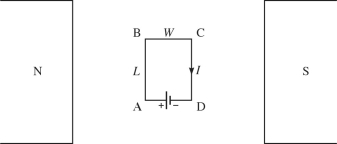
A)perpendicular to and into the page
B)perpendicular to and out of the page
C)in the direction of the field
field
D)in the opposite direction of the field
field
E)The force is zero.

A)perpendicular to and into the page
B)perpendicular to and out of the page
C)in the direction of the
 field
fieldD)in the opposite direction of the
 field
fieldE)The force is zero.

Unlock Deck
Unlock for access to all 136 flashcards in this deck.
Unlock Deck
k this deck
24
At a particular instant,an electron moves toward the east in a uniform  field that is directed straight downward.The magnetic force exerted on it is
field that is directed straight downward.The magnetic force exerted on it is
A)zero.
B)upward.
C)toward the north.
D)toward the south.
E)downward.
 field that is directed straight downward.The magnetic force exerted on it is
field that is directed straight downward.The magnetic force exerted on it isA)zero.
B)upward.
C)toward the north.
D)toward the south.
E)downward.

Unlock Deck
Unlock for access to all 136 flashcards in this deck.
Unlock Deck
k this deck
25
For the horseshoe magnet shown in the figure,the left end is a north magnetic pole and the right end is a south magnetic pole.When the switch is closed in the circuit,which way will the wire between the poles of the horseshoe magnet initially deflect? 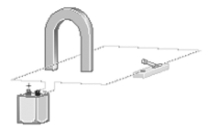
A)to the right
B)to the left
C)upward
D)downward

A)to the right
B)to the left
C)upward
D)downward

Unlock Deck
Unlock for access to all 136 flashcards in this deck.
Unlock Deck
k this deck
26
After landing on an unexplored Klingon planet,Mr.Spock investigates the direction of the magnetic field by firing a beam of electrons in various directions and by recording the following observations: A magnetic force in the northwest direction is exerted on the clectrons moving upward.
Electrons moving horizontally toward the north are pushed downward.
Electrons moving horizontally toward the southeast are pushed upward.
Mr.Spock therefore concludes that the field at this landing site is in which direction?
field at this landing site is in which direction?
A)toward the east
B)toward the northeast
C)toward the southwest
D)toward the southeast
E)toward the west
Electrons moving horizontally toward the north are pushed downward.
Electrons moving horizontally toward the southeast are pushed upward.
Mr.Spock therefore concludes that the
 field at this landing site is in which direction?
field at this landing site is in which direction?A)toward the east
B)toward the northeast
C)toward the southwest
D)toward the southeast
E)toward the west

Unlock Deck
Unlock for access to all 136 flashcards in this deck.
Unlock Deck
k this deck
27
A proton has an initial velocity to the south but is observed to curve upward as the result of a magnetic field.This  field must have a component
field must have a component
A)to the west.
B)to the east.
C)upward.
D)downward.
E)to the north.
 field must have a component
field must have a componentA)to the west.
B)to the east.
C)upward.
D)downward.
E)to the north.

Unlock Deck
Unlock for access to all 136 flashcards in this deck.
Unlock Deck
k this deck
28
A rectangular coil,with corners labeled ABCD,has length L and width w.It is placed between the poles of a magnet,as shown in the figure.If there is a current I through this coil in the direction shown,what is the direction of the force exerted on section CD of this coil? 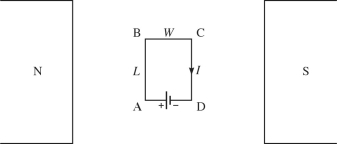
A)perpendicular to and into the page
B)perpendicular to and out of the page
C)in the direction of the field
field
D)in the opposite direction of the field
field
E)The force is zero.

A)perpendicular to and into the page
B)perpendicular to and out of the page
C)in the direction of the
 field
fieldD)in the opposite direction of the
 field
fieldE)The force is zero.

Unlock Deck
Unlock for access to all 136 flashcards in this deck.
Unlock Deck
k this deck
29
If a calculated quantity has units of  ,that quantity could be
,that quantity could be
A)an field.
field.
B)an electric potential.
C)μ0.
D)a field.
field.
E)a magnetic torque.
 ,that quantity could be
,that quantity could beA)an
 field.
field.B)an electric potential.
C)μ0.
D)a
 field.
field.E)a magnetic torque.

Unlock Deck
Unlock for access to all 136 flashcards in this deck.
Unlock Deck
k this deck
30
A charged particle moves with a constant speed through a region where a uniform magnetic field is present.If the  field points straight upward,the magnetic force exerted on this particle will be strongest when the particle moves
field points straight upward,the magnetic force exerted on this particle will be strongest when the particle moves
A)straight upward.
B)straight downward.
C)in a plane parallel to Earth's surface.
D)upward at an angle of 45° above the horizontal.
 field points straight upward,the magnetic force exerted on this particle will be strongest when the particle moves
field points straight upward,the magnetic force exerted on this particle will be strongest when the particle movesA)straight upward.
B)straight downward.
C)in a plane parallel to Earth's surface.
D)upward at an angle of 45° above the horizontal.

Unlock Deck
Unlock for access to all 136 flashcards in this deck.
Unlock Deck
k this deck
31
The magnetic force exerted on a current-carrying wire in a magnetic field is the strongest when
A)the current is in the direction of the field lines.
field lines.
B)the current is in the direction opposite to the field lines.
field lines.
C)the current is at a 180° angle with respect to the field lines.
field lines.
D)the current is perpendicular to the field lines.
field lines.
E)the current is at a 0° angle with respect to the field lines.
field lines.
A)the current is in the direction of the
 field lines.
field lines.B)the current is in the direction opposite to the
 field lines.
field lines.C)the current is at a 180° angle with respect to the
 field lines.
field lines.D)the current is perpendicular to the
 field lines.
field lines.E)the current is at a 0° angle with respect to the
 field lines.
field lines.
Unlock Deck
Unlock for access to all 136 flashcards in this deck.
Unlock Deck
k this deck
32
A wire is carrying current vertically downward.What is the direction of the force exerted on this wire due to Earth's magnetic field?
A)horizontally towards the north
B)horizontally towards the south
C)horizontally towards the east
D)horizontally towards the west
E)vertically upward
A)horizontally towards the north
B)horizontally towards the south
C)horizontally towards the east
D)horizontally towards the west
E)vertically upward

Unlock Deck
Unlock for access to all 136 flashcards in this deck.
Unlock Deck
k this deck
33
At a particular instant,a proton moves toward the east in a uniform  field that is directed straight downward.The magnetic force exerted on it is
field that is directed straight downward.The magnetic force exerted on it is
A)zero.
B)upward.
C)toward the north.
D)toward the south.
E)downward.
 field that is directed straight downward.The magnetic force exerted on it is
field that is directed straight downward.The magnetic force exerted on it isA)zero.
B)upward.
C)toward the north.
D)toward the south.
E)downward.

Unlock Deck
Unlock for access to all 136 flashcards in this deck.
Unlock Deck
k this deck
34
A negatively-charged particle moves across a constant uniform  field that is perpendicular to the velocity of the particle.The magnetic force exerted on this particle
field that is perpendicular to the velocity of the particle.The magnetic force exerted on this particle
A)causes the particle to speed up.
B)causes the particle to slow down.
C)causes the particle to accelerate.
D)is in the same direction as the particle's velocity.
E)is opposite the direction of the particle's velocity.
 field that is perpendicular to the velocity of the particle.The magnetic force exerted on this particle
field that is perpendicular to the velocity of the particle.The magnetic force exerted on this particleA)causes the particle to speed up.
B)causes the particle to slow down.
C)causes the particle to accelerate.
D)is in the same direction as the particle's velocity.
E)is opposite the direction of the particle's velocity.

Unlock Deck
Unlock for access to all 136 flashcards in this deck.
Unlock Deck
k this deck
35
A rectangular coil,with corners labeled ABCD,has length L and width w.It is placed between the poles of a magnet,as shown in the figure If there is a current I through this coil in the direction shown,what is the direction of the force exerted on section BC of this coil? 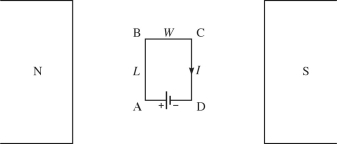
A)perpendicular to and into the page
B)perpendicular to and out of the page
C)in the direction of the field
field
D)in the opposite direction of the field
field
E)The force is zero.

A)perpendicular to and into the page
B)perpendicular to and out of the page
C)in the direction of the
 field
fieldD)in the opposite direction of the
 field
fieldE)The force is zero.

Unlock Deck
Unlock for access to all 136 flashcards in this deck.
Unlock Deck
k this deck
36
A particle carrying a charge of +e travels in a circular path of radius R in a uniform magnetic field.If instead the particle carried a charge of +2e,the radius of the circular path would have been
A)2R.
B)4R.
C)8R.
D)R/2.
E)R/4.
A)2R.
B)4R.
C)8R.
D)R/2.
E)R/4.

Unlock Deck
Unlock for access to all 136 flashcards in this deck.
Unlock Deck
k this deck
37
A charged particle is injected into a uniform magnetic field such that its velocity vector is perpendicular to the  field lines.Ignoring the force that Earth exerts on the particle,the particle will
field lines.Ignoring the force that Earth exerts on the particle,the particle will
A)move in a straight line.
B)follow a spiral path.
C)move along a parabolic path.
D)follow a circular path.
 field lines.Ignoring the force that Earth exerts on the particle,the particle will
field lines.Ignoring the force that Earth exerts on the particle,the particle willA)move in a straight line.
B)follow a spiral path.
C)move along a parabolic path.
D)follow a circular path.

Unlock Deck
Unlock for access to all 136 flashcards in this deck.
Unlock Deck
k this deck
38
A charged particle is observed traveling in a circular path of radius R in a uniform magnetic field.If the particle were traveling twice as fast,the radius of the circular path would be
A)2R.
B)4R.
C)8R.
D)R/2.
E)R/4.
A)2R.
B)4R.
C)8R.
D)R/2.
E)R/4.

Unlock Deck
Unlock for access to all 136 flashcards in this deck.
Unlock Deck
k this deck
39
A proton,moving in a uniform magnetic field,moves in a circle perpendicular to the  field lines and takes time T for each circle.If the proton's speed tripled,what would now be its time to go around each circle?
field lines and takes time T for each circle.If the proton's speed tripled,what would now be its time to go around each circle?
A)9T
B)3T
C)T
D)T/3
E)T/9
 field lines and takes time T for each circle.If the proton's speed tripled,what would now be its time to go around each circle?
field lines and takes time T for each circle.If the proton's speed tripled,what would now be its time to go around each circle?A)9T
B)3T
C)T
D)T/3
E)T/9

Unlock Deck
Unlock for access to all 136 flashcards in this deck.
Unlock Deck
k this deck
40
When the switch is closed in the circuit shown in the figure,the wire between the poles of the horseshoe magnet deflects upward.From this you can conclude that the left end of the magnet is 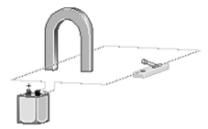
A)a north magnetic pole.
B)a south magnetic pole.
C)There is not enough information given to answer the question.

A)a north magnetic pole.
B)a south magnetic pole.
C)There is not enough information given to answer the question.

Unlock Deck
Unlock for access to all 136 flashcards in this deck.
Unlock Deck
k this deck
41
A long,straight,horizontal wire carries current toward the east.A proton moves toward the east alongside and just south of the wire.What is the direction of the magnetic force exerted on the proton?
A)toward the north
B)toward the south
C)upward
D)downward
E)toward the east.
A)toward the north
B)toward the south
C)upward
D)downward
E)toward the east.

Unlock Deck
Unlock for access to all 136 flashcards in this deck.
Unlock Deck
k this deck
42
A long,straight,horizontal wire carries current toward the east.An electron moves toward the east alongside and just south of the wire.What is the direction of the magnetic force exerted on the electron?
A)toward the north
B)toward the south
C)upward
D)downward
E)toward the west.
A)toward the north
B)toward the south
C)upward
D)downward
E)toward the west.

Unlock Deck
Unlock for access to all 136 flashcards in this deck.
Unlock Deck
k this deck
43
A wire lying in the plane of this page carries a current directly toward the top of the page.What is the direction of the magnetic force this current-carrying wire exerts on an electron that is moving perpendicular to the page and outward from it on the left side of the wire?
A)perpendicular to the page and towards you
B)perpendicular to the page and away from you
C)toward the top of the page
D)toward the bottom of the page
E)The force is zero.
A)perpendicular to the page and towards you
B)perpendicular to the page and away from you
C)toward the top of the page
D)toward the bottom of the page
E)The force is zero.

Unlock Deck
Unlock for access to all 136 flashcards in this deck.
Unlock Deck
k this deck
44
Two long parallel wires are placed side-by-side on a horizontal table.If the wires carry current in opposite directions,
A)one wire is lifted slightly while the other wire is forced downward against the table's surface.
B)both wires are lifted slightly.
C)the wires pull toward each other.
D)the wires push away from each other.
A)one wire is lifted slightly while the other wire is forced downward against the table's surface.
B)both wires are lifted slightly.
C)the wires pull toward each other.
D)the wires push away from each other.

Unlock Deck
Unlock for access to all 136 flashcards in this deck.
Unlock Deck
k this deck
45
Which of the following are units for the magnetic moment? (There could be more than one correct choice.)
A)
B)A ∙ m2
C)N ∙ m/T
D)T/m2
A)

B)A ∙ m2
C)N ∙ m/T
D)T/m2

Unlock Deck
Unlock for access to all 136 flashcards in this deck.
Unlock Deck
k this deck
46
A negatively charged particle -Q is moving to the right,directly above a wire having a current I through it to the right,as shown in the figure.In what direction is the magnetic force exerted on the particle by the current-carrying wire? 
A)into the page
B)out of the page
C)downward
D)upward
E)The magnetic force is zero because the velocity is parallel to the current.

A)into the page
B)out of the page
C)downward
D)upward
E)The magnetic force is zero because the velocity is parallel to the current.

Unlock Deck
Unlock for access to all 136 flashcards in this deck.
Unlock Deck
k this deck
47
A very long straight current-carrying wire produces a  field of 20 mT at a distance d from the wire.To measure a field of 5 mT due to this wire,you would have to go to a distance from the wire of
field of 20 mT at a distance d from the wire.To measure a field of 5 mT due to this wire,you would have to go to a distance from the wire of
A)16d.
B)8d.
C)4d.
D)2d.
E)d
 field of 20 mT at a distance d from the wire.To measure a field of 5 mT due to this wire,you would have to go to a distance from the wire of
field of 20 mT at a distance d from the wire.To measure a field of 5 mT due to this wire,you would have to go to a distance from the wire ofA)16d.
B)8d.
C)4d.
D)2d.
E)d


Unlock Deck
Unlock for access to all 136 flashcards in this deck.
Unlock Deck
k this deck
48
The  field at a distance of 2 cm from a long straight current-carrying wire is 4 μT.What is the
field at a distance of 2 cm from a long straight current-carrying wire is 4 μT.What is the  field at a distance of 1 cm from this wire?
field at a distance of 1 cm from this wire?
A)2 μT
B)4 μT
C)6 μT
D)8 μT
E)10 μT
 field at a distance of 2 cm from a long straight current-carrying wire is 4 μT.What is the
field at a distance of 2 cm from a long straight current-carrying wire is 4 μT.What is the  field at a distance of 1 cm from this wire?
field at a distance of 1 cm from this wire?A)2 μT
B)4 μT
C)6 μT
D)8 μT
E)10 μT

Unlock Deck
Unlock for access to all 136 flashcards in this deck.
Unlock Deck
k this deck
49
A horizontal wire carries a current straight toward you.From your point of view,the  field caused by this current
field caused by this current
A)points directly away from you.
B)points to the left.
C)circles the wire in a clockwise direction.
D)circles the wire in a counter-clockwise direction.
 field caused by this current
field caused by this currentA)points directly away from you.
B)points to the left.
C)circles the wire in a clockwise direction.
D)circles the wire in a counter-clockwise direction.

Unlock Deck
Unlock for access to all 136 flashcards in this deck.
Unlock Deck
k this deck
50
Which one of the following statements is correct?
A)When a current-carrying wire is in your right hand, with your thumb in the direction of the current, your fingers point opposite to the direction of the field lines.
field lines.
B)When a current-carrying wire is in your right hand, with your thumb in the direction of the current, your fingers point in the direction of the field lines.
field lines.
C)When a current-carrying wire is in your left hand, with your thumb in the direction of the current, your fingers point in the direction of the field lines.
field lines.
A)When a current-carrying wire is in your right hand, with your thumb in the direction of the current, your fingers point opposite to the direction of the
 field lines.
field lines.B)When a current-carrying wire is in your right hand, with your thumb in the direction of the current, your fingers point in the direction of the
 field lines.
field lines.C)When a current-carrying wire is in your left hand, with your thumb in the direction of the current, your fingers point in the direction of the
 field lines.
field lines.
Unlock Deck
Unlock for access to all 136 flashcards in this deck.
Unlock Deck
k this deck
51
The  field at a distance of 2 cm from a long straight current-carrying wire is 4 μT.What is the
field at a distance of 2 cm from a long straight current-carrying wire is 4 μT.What is the  field at a distance of 4 cm from this wire?
field at a distance of 4 cm from this wire?
A)2 μT
B)4 μT
C)6 μT
D)8 μT
E)10 μT
 field at a distance of 2 cm from a long straight current-carrying wire is 4 μT.What is the
field at a distance of 2 cm from a long straight current-carrying wire is 4 μT.What is the  field at a distance of 4 cm from this wire?
field at a distance of 4 cm from this wire?A)2 μT
B)4 μT
C)6 μT
D)8 μT
E)10 μT

Unlock Deck
Unlock for access to all 136 flashcards in this deck.
Unlock Deck
k this deck
52
A wire lying in the plane of the page carries a current toward the bottom of the page,as shown in the figure.What is the direction of the magnetic force it exerts on an electron that is moving to the left directly toward the wire,as shown? 
A)straight into the page
B)straight out of the page
C)directly toward the top of the page
D)directly toward the bottom of the page
E)directly to the left away from the wire

A)straight into the page
B)straight out of the page
C)directly toward the top of the page
D)directly toward the bottom of the page
E)directly to the left away from the wire

Unlock Deck
Unlock for access to all 136 flashcards in this deck.
Unlock Deck
k this deck
53
Two long parallel wires are placed side-by-side on a horizontal table.If the wires carry current in the same direction,
A)one wire is lifted slightly while the other wire is forced downward against the table's surface.
B)both wires are lifted slightly.
C)the wires pull toward each other.
D)the wires push away from each other.
A)one wire is lifted slightly while the other wire is forced downward against the table's surface.
B)both wires are lifted slightly.
C)the wires pull toward each other.
D)the wires push away from each other.

Unlock Deck
Unlock for access to all 136 flashcards in this deck.
Unlock Deck
k this deck
54
A long straight wire carrying a 4-A current is placed along the x-axis as shown in the figure.What is the direction of the  field at a point P due to this wire?
field at a point P due to this wire? 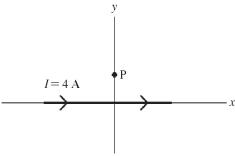
A)into the plane of the page
B)out of the plane of the page
C)along the -x-axis
D)along the +x-axis
E)along the +y-axis
 field at a point P due to this wire?
field at a point P due to this wire? 
A)into the plane of the page
B)out of the plane of the page
C)along the -x-axis
D)along the +x-axis
E)along the +y-axis

Unlock Deck
Unlock for access to all 136 flashcards in this deck.
Unlock Deck
k this deck
55
Two long parallel wires placed side-by-side on a horizontal table carry identical size currents in opposite directions.The wire on your right carries current directly toward you,and the wire on your left carries current directly away from you.From your point of view,the  field at a point exactly midway between the two wires
field at a point exactly midway between the two wires
A)points upward.
B)points downward.
C)points toward you.
D)points away from you.
E)is zero.
 field at a point exactly midway between the two wires
field at a point exactly midway between the two wiresA)points upward.
B)points downward.
C)points toward you.
D)points away from you.
E)is zero.

Unlock Deck
Unlock for access to all 136 flashcards in this deck.
Unlock Deck
k this deck
56
The maximum torque exerted on a flat current-carrying loop occurs when the angle between the plane of the loop's area and the  field vector is
field vector is
A)0°
B)45°
C)90°
D)135°
 field vector is
field vector isA)0°
B)45°
C)90°
D)135°

Unlock Deck
Unlock for access to all 136 flashcards in this deck.
Unlock Deck
k this deck
57
Two long parallel wires placed side-by-side on a horizontal table carry identical current straight toward you.From your point of view,the  field at a point exactly between the two wires
field at a point exactly between the two wires
A)points upward.
B)points downward.
C)points toward you.
D)points away from you.
E)is zero.
 field at a point exactly between the two wires
field at a point exactly between the two wiresA)points upward.
B)points downward.
C)points toward you.
D)points away from you.
E)is zero.

Unlock Deck
Unlock for access to all 136 flashcards in this deck.
Unlock Deck
k this deck
58
A long,straight wire carrying a current is placed along the y-axis.If the direction of the current is in the +y direction,what is the direction of the  field due to this wire as you view it in such a way that the current is coming directly toward you?
field due to this wire as you view it in such a way that the current is coming directly toward you?
A)clockwise, around the x-axis
B)counterclockwise, around the x-axis
C)counterclockwise, around the z-axis
D)counterclockwise, around the y-axis
E)clockwise, around the y-axis
 field due to this wire as you view it in such a way that the current is coming directly toward you?
field due to this wire as you view it in such a way that the current is coming directly toward you?A)clockwise, around the x-axis
B)counterclockwise, around the x-axis
C)counterclockwise, around the z-axis
D)counterclockwise, around the y-axis
E)clockwise, around the y-axis

Unlock Deck
Unlock for access to all 136 flashcards in this deck.
Unlock Deck
k this deck
59
A flat circular wire loop lies in a horizontal plane on a table and carries current in a counterclockwise direction when viewed from above.At this point,Earth's  field points to the north and dips below the horizontal.Which side of the coil tends to lift off of the table due to the magnetic torque on the loop?
field points to the north and dips below the horizontal.Which side of the coil tends to lift off of the table due to the magnetic torque on the loop?
A)the north side
B)the east side
C)the south side
D)the west side
E)The entire loop lifts straight up.
 field points to the north and dips below the horizontal.Which side of the coil tends to lift off of the table due to the magnetic torque on the loop?
field points to the north and dips below the horizontal.Which side of the coil tends to lift off of the table due to the magnetic torque on the loop?A)the north side
B)the east side
C)the south side
D)the west side
E)The entire loop lifts straight up.

Unlock Deck
Unlock for access to all 136 flashcards in this deck.
Unlock Deck
k this deck
60
A vertical wire carries a current vertically downward.To the east of this wire,the  field points
field points
A)north.
B)east.
C)south.
D)down.
 field points
field pointsA)north.
B)east.
C)south.
D)down.

Unlock Deck
Unlock for access to all 136 flashcards in this deck.
Unlock Deck
k this deck
61
An electron moves with a speed of 8.0 × 106 m/s along the +x-axis.It enters a region where there is a magnetic field of 2.5 T,directed at an angle of 60° to the +x-axis and lying in the xy-plane.Calculate the magnitude of the magnetic force on the electron.(e = 1.60 × 10-19C)
A)2.8 × 10-10 N
B)3.2 × 10-10 N
C)2.8 × 10-12 N
D)3.2 × 10-12 N
A)2.8 × 10-10 N
B)3.2 × 10-10 N
C)2.8 × 10-12 N
D)3.2 × 10-12 N

Unlock Deck
Unlock for access to all 136 flashcards in this deck.
Unlock Deck
k this deck
62
A proton having a speed of 3.0 × 106 m/s in a direction perpendicular to a uniform magnetic field moves in a circle of radius 0.20 m within the field.What is the magnitude of the  field? (e = 1.60 × 10-19 C,mproton = 1.67 × 10-27 kg)
field? (e = 1.60 × 10-19 C,mproton = 1.67 × 10-27 kg)
A)0.080 T
B)0.16 T
C)0.24 T
D)0.32 T
E)0.36 T
 field? (e = 1.60 × 10-19 C,mproton = 1.67 × 10-27 kg)
field? (e = 1.60 × 10-19 C,mproton = 1.67 × 10-27 kg)A)0.080 T
B)0.16 T
C)0.24 T
D)0.32 T
E)0.36 T

Unlock Deck
Unlock for access to all 136 flashcards in this deck.
Unlock Deck
k this deck
63
A proton moving at 5.0 × 104 m/s horizontally enters a region where a  field of 0.12 T is present,directed vertically downward.What magnitude force acts on the proton due to this field?
field of 0.12 T is present,directed vertically downward.What magnitude force acts on the proton due to this field?
(e = 1.60 × 10-19C)
 field of 0.12 T is present,directed vertically downward.What magnitude force acts on the proton due to this field?
field of 0.12 T is present,directed vertically downward.What magnitude force acts on the proton due to this field?(e = 1.60 × 10-19C)

Unlock Deck
Unlock for access to all 136 flashcards in this deck.
Unlock Deck
k this deck
64
An electron traveling toward the magnetic north with speed 400 km/s enters a region where Earth's  field has the magnitude 5.0 × 10-5 T and is directed downward at 45° below horizontal.What magnitude magnetic force is exerted on the electron? (e = 1.60 × 10-19C)
field has the magnitude 5.0 × 10-5 T and is directed downward at 45° below horizontal.What magnitude magnetic force is exerted on the electron? (e = 1.60 × 10-19C)
 field has the magnitude 5.0 × 10-5 T and is directed downward at 45° below horizontal.What magnitude magnetic force is exerted on the electron? (e = 1.60 × 10-19C)
field has the magnitude 5.0 × 10-5 T and is directed downward at 45° below horizontal.What magnitude magnetic force is exerted on the electron? (e = 1.60 × 10-19C)
Unlock Deck
Unlock for access to all 136 flashcards in this deck.
Unlock Deck
k this deck
65
A proton travels at a speed of 5.0 × 107 m/s through a 1.0-T  field.What is the magnitude of the magnetic force exerted by the field on the proton if the angle between the proton's velocity and the
field.What is the magnitude of the magnetic force exerted by the field on the proton if the angle between the proton's velocity and the  field vector is 30°? (e = 1.60 × 10-19C)
field vector is 30°? (e = 1.60 × 10-19C)
A)2.0 × 10-14 N
B)4.0 × 10-14 N
C)2.0 × 10-12 N
D)4.0 × 10-12 N
 field.What is the magnitude of the magnetic force exerted by the field on the proton if the angle between the proton's velocity and the
field.What is the magnitude of the magnetic force exerted by the field on the proton if the angle between the proton's velocity and the  field vector is 30°? (e = 1.60 × 10-19C)
field vector is 30°? (e = 1.60 × 10-19C)A)2.0 × 10-14 N
B)4.0 × 10-14 N
C)2.0 × 10-12 N
D)4.0 × 10-12 N

Unlock Deck
Unlock for access to all 136 flashcards in this deck.
Unlock Deck
k this deck
66
Consider two current-carrying circular loops.Both are made from one strand of wire and both carry the same current,but one has twice the radius of the other.If the  field at the center of the smaller loop is
field at the center of the smaller loop is  1,what is the
1,what is the  field strength at the center of the larger loop?
field strength at the center of the larger loop?
A)8B1
B)4B1
C)2B1
D)B1/2
E)B1/4
 field at the center of the smaller loop is
field at the center of the smaller loop is  1,what is the
1,what is the  field strength at the center of the larger loop?
field strength at the center of the larger loop?A)8B1
B)4B1
C)2B1
D)B1/2
E)B1/4

Unlock Deck
Unlock for access to all 136 flashcards in this deck.
Unlock Deck
k this deck
67
A geophysicist measures the magnetic force exerted on a proton that is moving vertically downward at a point 1.996 km/s at Earth's equator.At that location,Earth's  field is horizontal and has a magnitude of 0.40 × 10-4 T.What are the magnitude and direction of the force she will measure? (e = 1.60 × 10-19C)
field is horizontal and has a magnitude of 0.40 × 10-4 T.What are the magnitude and direction of the force she will measure? (e = 1.60 × 10-19C)
 field is horizontal and has a magnitude of 0.40 × 10-4 T.What are the magnitude and direction of the force she will measure? (e = 1.60 × 10-19C)
field is horizontal and has a magnitude of 0.40 × 10-4 T.What are the magnitude and direction of the force she will measure? (e = 1.60 × 10-19C)
Unlock Deck
Unlock for access to all 136 flashcards in this deck.
Unlock Deck
k this deck
68
In the figure,a small particle of charge -1.9 x  C and mass
C and mass  has speed
has speed  as it enters a region of uniform magnetic field.The particle is initially traveling perpendicular to the magnetic field and is observed to travel in the semicircular path shown with radius R = 5.0 cm.Find the magnitude and direction of the
as it enters a region of uniform magnetic field.The particle is initially traveling perpendicular to the magnetic field and is observed to travel in the semicircular path shown with radius R = 5.0 cm.Find the magnitude and direction of the  field in the region.
field in the region. 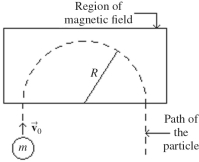
 C and mass
C and mass  has speed
has speed  as it enters a region of uniform magnetic field.The particle is initially traveling perpendicular to the magnetic field and is observed to travel in the semicircular path shown with radius R = 5.0 cm.Find the magnitude and direction of the
as it enters a region of uniform magnetic field.The particle is initially traveling perpendicular to the magnetic field and is observed to travel in the semicircular path shown with radius R = 5.0 cm.Find the magnitude and direction of the  field in the region.
field in the region. 

Unlock Deck
Unlock for access to all 136 flashcards in this deck.
Unlock Deck
k this deck
69
A proton moving with a velocity of 4.0 × 104 m/s enters a magnetic field of 0.20 T.If the angle between the velocity of the proton and the direction of the  field is 60°,what is the magnitude of the magnetic force exerted on the proton? (e = 1.60 × 10-19C)
field is 60°,what is the magnitude of the magnetic force exerted on the proton? (e = 1.60 × 10-19C)
A)1.8 × 10-15 N
B)0.60 × 10-15 N
C)1.1 × 10-15 N
D)2.2 × 10-15 N
 field is 60°,what is the magnitude of the magnetic force exerted on the proton? (e = 1.60 × 10-19C)
field is 60°,what is the magnitude of the magnetic force exerted on the proton? (e = 1.60 × 10-19C)A)1.8 × 10-15 N
B)0.60 × 10-15 N
C)1.1 × 10-15 N
D)2.2 × 10-15 N

Unlock Deck
Unlock for access to all 136 flashcards in this deck.
Unlock Deck
k this deck
70
An electron moving perpendicular to a uniform magnetic field of 0.22 T moves in a circle with a speed of 1.5 × 107 m/s.What is the radius of the circle? (e = 1.60 × 10-19 C,melectron = 9.11 × 10-31kg)
A)1.5 mm
B)0.22 mm
C)2.2 mm
D)0.39 mm
E)3.9 mm
A)1.5 mm
B)0.22 mm
C)2.2 mm
D)0.39 mm
E)3.9 mm

Unlock Deck
Unlock for access to all 136 flashcards in this deck.
Unlock Deck
k this deck
71
A single current-carrying circular loop of radius R is placed next to a long,straight wire,as shown in the figure.The current I in the wire flows to the right.In which direction must current flow in the loop to produce a net magnetic field of zero at its center? 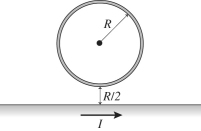
A)counterclockwise
B)clockwise
C)It could be either clockwise or counterclockwise.
D)The current in the loop should be zero.

A)counterclockwise
B)clockwise
C)It could be either clockwise or counterclockwise.
D)The current in the loop should be zero.

Unlock Deck
Unlock for access to all 136 flashcards in this deck.
Unlock Deck
k this deck
72
An electron moves with a speed of 8.0 × 106 m/s along the +x-axis.It enters a region where there is a magnetic field of 2.5 T,directed at an angle of 60° to the +x-axis and lying in the xy-plane.Calculate the magnitude of the acceleration of the electron.(e = 1.60 × 10-19 C,me1 = 9.11 × 10-31 kg)
A)1.3 × 1018 m/s2
B)3.0 × 1018 m/s2
C)1.3 × 10-18 m/s2
D)3.0 × 10-18 m/s2
E)0 m/s2
A)1.3 × 1018 m/s2
B)3.0 × 1018 m/s2
C)1.3 × 10-18 m/s2
D)3.0 × 10-18 m/s2
E)0 m/s2

Unlock Deck
Unlock for access to all 136 flashcards in this deck.
Unlock Deck
k this deck
73
A current-carrying loop of wire lies flat on a horizontal tabletop.When viewed from above,the current through the loop is in a counterclockwise sense.For points on the tabletop inside the loop,the  field lines caused by this current
field lines caused by this current
A)circle the loop in a clockwise direction.
B)circle the loop in a counterclockwise direction.
C)point straight up.
D)point straight down.
 field lines caused by this current
field lines caused by this currentA)circle the loop in a clockwise direction.
B)circle the loop in a counterclockwise direction.
C)point straight up.
D)point straight down.

Unlock Deck
Unlock for access to all 136 flashcards in this deck.
Unlock Deck
k this deck
74
A proton is accelerated from rest through 0.50 kV.It then enters a uniform magnetic field of 0.30 T that is oriented perpendicular to its direction of motion.
(a)What is the radius of the path the proton follows in the magnetic field?
(b)How long does it take the proton to make one complete circle in the magnetic field?.
(a)What is the radius of the path the proton follows in the magnetic field?
(b)How long does it take the proton to make one complete circle in the magnetic field?.

Unlock Deck
Unlock for access to all 136 flashcards in this deck.
Unlock Deck
k this deck
75
An electron moves with a speed of 3.0 × 104 m/s perpendicular to a uniform magnetic field of 0.40 T.What is the magnitude of the magnetic force exerted on the electron? (e = 1.60 × 10-19C)
A)4.8 × 10-14 N
B)1.9 × 10-15 N
C)5 × 10-20 N
D)2.2 × 10-24 N
A)4.8 × 10-14 N
B)1.9 × 10-15 N
C)5 × 10-20 N
D)2.2 × 10-24 N

Unlock Deck
Unlock for access to all 136 flashcards in this deck.
Unlock Deck
k this deck
76
An electron moving perpendicular to a uniform magnetic field of 3.2 × 10-2 T moves in a circle of radius 0.40 cm.How fast is this electron moving? (e = 1.60 × 10-19 C,melectron = 9.11 × 10-31kg)
A)2.2 × 107 m/s
B)1.9 × 107 m/s
C)1.9 × 106 m/s
D)3.0 × 107 m/s
E)0.80 × 107 m/s
A)2.2 × 107 m/s
B)1.9 × 107 m/s
C)1.9 × 106 m/s
D)3.0 × 107 m/s
E)0.80 × 107 m/s

Unlock Deck
Unlock for access to all 136 flashcards in this deck.
Unlock Deck
k this deck
77
A proton,with mass 1.67 × 10-27 kg and charge +1.6 × 10-19 C,is sent with velocity  in the +x direction into a region where there is a uniform
in the +x direction into a region where there is a uniform  field of magnitude
field of magnitude  in the +y direction.What must be the magnitude and direction of the uniform
in the +y direction.What must be the magnitude and direction of the uniform  field in the region if the proton is to pass through undeflected? Assume that the magnetic field has no x component and neglect gravitational effects.
field in the region if the proton is to pass through undeflected? Assume that the magnetic field has no x component and neglect gravitational effects.
 in the +x direction into a region where there is a uniform
in the +x direction into a region where there is a uniform  field of magnitude
field of magnitude  in the +y direction.What must be the magnitude and direction of the uniform
in the +y direction.What must be the magnitude and direction of the uniform  field in the region if the proton is to pass through undeflected? Assume that the magnetic field has no x component and neglect gravitational effects.
field in the region if the proton is to pass through undeflected? Assume that the magnetic field has no x component and neglect gravitational effects.
Unlock Deck
Unlock for access to all 136 flashcards in this deck.
Unlock Deck
k this deck
78
A proton moving eastward with a velocity of 5.0 km/s enters a magnetic field of 0.20 T pointing northward.What are the magnitude and direction of the force that the magnetic field exerts on the proton? (e = 1.60 × 10-19C)
A)0 N
B)1.6 × 10-16 N upwards
C)1.6 × 10-16 N downwards
D)1.1 × 10-16 N eastwards
A)0 N
B)1.6 × 10-16 N upwards
C)1.6 × 10-16 N downwards
D)1.1 × 10-16 N eastwards

Unlock Deck
Unlock for access to all 136 flashcards in this deck.
Unlock Deck
k this deck
79
A current-carrying loop of wire lies flat on a horizontal tabletop.When viewed from above,the direction of the current around the loop is in a counterclockwise sense.For points on the tabletop outside the loop,the  field lines caused by this current
field lines caused by this current
A)circle the loop in a clockwise direction.
B)circle the loop in a counterclockwise direction.
C)point straight up.
D)point straight down.
 field lines caused by this current
field lines caused by this currentA)circle the loop in a clockwise direction.
B)circle the loop in a counterclockwise direction.
C)point straight up.
D)point straight down.

Unlock Deck
Unlock for access to all 136 flashcards in this deck.
Unlock Deck
k this deck
80
A long straight wire has a constant current through it to the right.A rectangular metal loop is situated above the wire,and also has a constant current through it,as shown in the figure.Which one of the following statements is true? 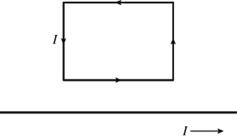
A)The net magnetic force exerted on the rectangle is upward, and there is also a nonzero torque exerted on the rectangle.
B)The net magnetic force exerted on the rectangle is zero, and the net torque on it is zero.
C)The net magnetic force exerted on the rectangle is downward, and there is also a nonzero torque on the rectangle.
D)The net magnetic force exerted on the rectangle is zero, but there is a nonzero torque on the rectangle.
E)The net magnetic exerted force on the rectangle is downward, and the net torque on it is zero.

A)The net magnetic force exerted on the rectangle is upward, and there is also a nonzero torque exerted on the rectangle.
B)The net magnetic force exerted on the rectangle is zero, and the net torque on it is zero.
C)The net magnetic force exerted on the rectangle is downward, and there is also a nonzero torque on the rectangle.
D)The net magnetic force exerted on the rectangle is zero, but there is a nonzero torque on the rectangle.
E)The net magnetic exerted force on the rectangle is downward, and the net torque on it is zero.

Unlock Deck
Unlock for access to all 136 flashcards in this deck.
Unlock Deck
k this deck


